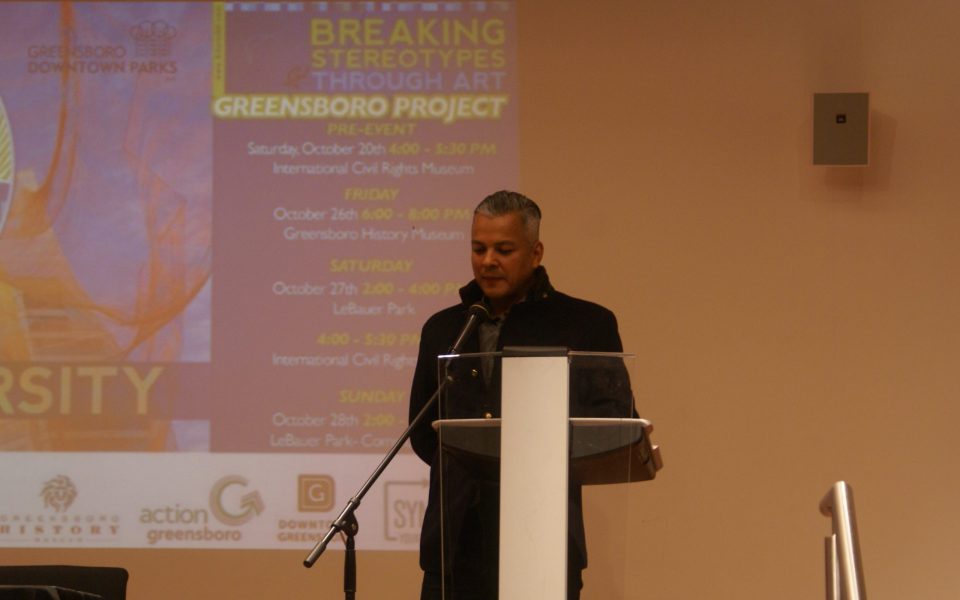Discomfort is a necessity.
This raw sentiment reverberates throughout the International Civil Rights Center & Museum as six local panelists dig into how they navigate diversity in their respective fields. This event just marks the beginning.
Edwin Gil’s Faces of Diversity project aims to produce 111 portraits, each representing a city from around the world. The Greensboro installment, No. 43, culminates with four events throughout the upcoming weekend; these panels held on Oct. 20 served as the launch point.
Through glass upcycling and paint, guests are invited to make a personal touch on the project — literally. During discussions, a dance, and a Halloween party, Gil requests participants to leave fingerprints, which are then compiled into mosaic portraits. Though sometimes uncomfortable, providing a stranger a fingerprint solidifies that moment as a memory. Gil counts on guests remembering not only the print, but the meanings behind the events that surround them as well, engaging both the mind and body to experience the unknown.
Once assembled, the Greensboro Cultural Center will house the final piece. For the inaugural kickoff however, the museum provides a contextual backdrop for this project centering around diversity. CEO John Swaine believes the project parallels the museum’s mission.
“It reveals something about the humanity of the community,” He explains. “This community is a complex tapestry.”
Gil was inspired by the fingerprint for its individual nature. Two people may share the same features but never fingerprints. Like threads in a tapestry, they combine to construct something greater than the sum of their parts. The Colombian artist aims to bring a component of vulnerability to the project, for good reason.
“Sometimes it’s kind of hard to leave that comfort zone, and cross that border,” he says.
The panels don’t shy from this idea.
The first panel consisted of Program Director of the National Conference for Community and Justice Michael Robinson, FaithAction International board member Chi Nguyen and Lumbee tribe member Amanda Jacobs. The panelists drew attention to the position Greensboro finds itself in — with some progress made but needing to be continued.
Nguyen suggests that diversity often must be sought out. Jacobs agrees, narrating how she had to venture out to connect with other local Native Americans. While difficult to confront the idea of still-needed progress, Robinson comments that “the tension is necessary for growth.”
The second panel, featuring Gwen Frisbie-Fulton, Victor Sanchez and Paul Byun, focused on promoting diversity in their workplaces. Sanchez, a sergeant in the Greensboro Police Department, strives to diversify the police force and challenge any bias he encounters on the job. Byun combats these biases through his videography, placing attention on underrepresented communities. An author and storyteller, Fulton desires to provide a platform for others to narrate their own stories.
She points out that it’s essential to “move ourselves to uncomfortable spaces.”
The discomfort is formulaic, almost. To leave the comfortable and to confront the unknown fosters learning.
And this learning must start at a younger age, as organizer Maria Gonzalez explains. Respecting differences must be taught early, as they are inevitable.
With more than 100,000 fingerprints gathered thus far, Gil hopes to bring the celebration of difference to multiple audiences. Gil hopes to “pop bubbles” that people of all ages form around themselves with these varied events. Through his work, Gil reminds the audience that risk-taking can be positive, and encourages people to not just view the artwork but also become a part of it.
“Art allows humans to talk about things we usually don’t,” he says.
Join the First Amendment Society, a membership that goes directly to funding TCB‘s newsroom.
We believe that reporting can save the world.
The TCB First Amendment Society recognizes the vital role of a free, unfettered press with a bundling of local experiences designed to build community, and unique engagements with our newsroom that will help you understand, and shape, local journalism’s critical role in uplifting the people in our cities.
All revenue goes directly into the newsroom as reporters’ salaries and freelance commissions.


Leave a Reply